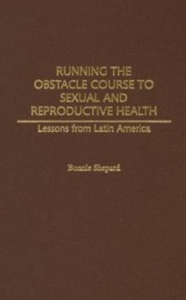A Review of Running the Obstacle Course to Sexual and Reproductive Health: Lessons from Latin America
Sex and the Continent: A Double Discourse
 Running the Obstacle Course to Sexual and Reproductive Health: Lessons from Latin America
Running the Obstacle Course to Sexual and Reproductive Health: Lessons from Latin America
By Bonnie Shepard
Praeger, Westport, CT, 2006, 215 pp.
Although the idea of learning from Latin America is too often counterintuitive for readers used to viewing the world by default through the lens of the north, the continent regularly generates political and social phenomena later picked up and imitated widely with little recognition of its origins. Liberation theology elaborated and practiced by Peruvian and Brazilian clergy and lay Catholics in Central America filtered northward in its heyday. Similarly, the Bush Administration’s practice of ‘rendering’ unofficially detained prisoners to be tortured by Egyptian or Uzbek secret police will be eerily familiar to anyone knowledgeable of the mass disappearances in Latin America during the 1970s or the well-documented collaboration among the secret police forces of the continent’s gorilla dictatorships.
Bonnie Shepard, who was a Ford Foundation program officer for several years, suggests in her new book that Latin America’s experience provides unique raw material for understanding the pursuit of sexual and reproductive health worldwide. Her case studies tracing the progress of relevant initiatives in Chile, Peru and elsewhere show contradictory forces at work in these countries in a stop-and-start process of gradual change. Again and again, shifting political and economic conditions and innovative grassroots efforts bring in their wake promising possibilities of greater equity and improved sexual and reproductive health for citizens, only to bump up against deep-rooted resistance to change, sometimes structural, sometimes ideological in nature. In Shepard’s reconstruction of these efforts, religious conservatives and traditional elites do plenty of damage, which health advocates sometimes overcome and sometimes don’t. As a participant in Chile’s first non-profit AIDS advocacy network, I had many opportunities to reflect on these strategies with her and, upon seeing an early draft of her Chile chapter, encouraged her to sharpen her criticism of the state and nonprofit sectors’ shortcomings.
Shepard, a 1998-2000 fellow at the David Rockefeller Center on Latin American Studies and later Senior Program Manager in the International Health and Human Rights Program at the Harvard School of Public Health, frames her discussion of reproductive and sexual rights and health issues with a description of the peculiarly Catholic ‘double discourse’ common to the region in which strict standards of sexual decorum are vigorously defended in the public sphere while exceptions are privately tolerated. This unspoken acceptance of hidden violations of strict social norms is vaguely shocking to our more Puritanical tradition which considers hypocrisy a grave shortcoming. But Shepard convincingly traces the coherent inner logic of this system which provides for human frailty through the safety valve of forgivable sins—especially for those who have the economic means to avoid the unwanted consequences. The paradox of right-wing legislators battling a change in the divorce laws even when they themselves are on their second or third marriages takes shape within a perversely rational universe in which people, especially men, are permitted or even expected to err in secret while upholding virtue and propriety in public. This stance is both exasperating and difficult to combat in public debate as it both recognizes diversity and condemns it, applauds ‘virtue’ and simultaneously winks at ‘vice.’ One result is that individuals suffer more disease, unwanted pregnancy, poverty, discrimination and stigma while an alternative, rights-based discourse is undermined by the continuing grip of traditional religious beliefs, which are surprisingly potent even among those who do not behave accordingly.
In another chapter Shepard plumbs the many issues that arise when dissimilar groups unite to advance their goals through networks, ad hoc action committees, coordinating councils or the like. While the advantages of unity are readily apparent—increased legitimacy and visibility, synergy among the cooperating groups, access to resources and training, more efficient campaigns—the author cautions that each of these advantages comes at a cost. Joint advocacy runs into the sensitive issue of confronting or criticizing governments that can affect participant organizations’ survival; groups agreeing on one topic may vigorously disagree on another; network leaders gain access to key contacts and can benefit their own groups to the disadvantage of their competitors; growth of a network means additional labor that must be performed by individual members for the benefit of the collective. In a series of detailed recommendations Shepard suggests that efforts devoted to reflecting on and addressing these knotty issues as early as possible will be rewarded as networking groups consider the sizeable investments implied by their strategy decisions along the way.
The heart of the book is comprised of two case studies: the lengthy battle for comprehensive sexuality education in Chile and a six-site Women’s Consortium project in Peru designed to improve reproductive health services under the slogan “Let’s Be Citizens—Not Patients!” These accounts probe a rich vein of political and practical issues arising from two well-conceived programs and the structural and political resistance that arose in response. The Peruvian initiative sensitively explored how to bring users and providers together in a non-threatening and yet critical way to improve service delivery. But it occurred just as the country’s authoritarian leadership under Fujimori was coercing women into quota-driven sterilization campaigns, forcing the participating groups to make hard choices about their cooperative relationship with the state—and leading to bitter divisions among them.
Chile’s saga of the pursuit of universal sexuality education is a more classically ideological set-piece battle, in which the minority conservatives mobilized with extraordinary single-mindedness to crush any threat to the privileged place of Catholic dogma on sex. The cleverly designed JOCAS program—that dispensed with written texts to avoid the usual controversies—was pilloried in a sustained attack by traditional economic and political elites. Defenders of sexual and reproductive rights, even with clear majority support around the country, eventually were outflanked as the centrist government buckled under the high political cost of defending its program. Shepard reports that the JOCAS survive and are easily replicable at low cost while acknowledging that the government’s failure of nerve has pushed sexuality education back onto local initiatives, undermining adolescents’ right to this knowledge and training.
In her summary the author outlines recurring issues facing those seeking to improve people’s sexual and reproductive health, including the intense controversies surrounding these topics but also many subtle and tricky problems of strategy and tactics: how to legitimize community representation through unelected non-profit leaders; how to build a coalition and develop a communications strategy; how to link one’s efforts to regional or worldwide networks; how to sustain projects or programs in the face of other major changes taking place in Latin American societies such as health and school sector reforms. (She could have added the ongoing demographic transitions occurring throughout the continent that have influenced sexual habits.) The book, while not pretending to offer ready formulae for these complex obstacles, contributes to the discussion with a sober, meticulous and fully grounded analysis.
Tim Frasca is the author of AIDS In Latin America (Palgrave, 2005) and currently works for the Latino Commission on AIDS on HIV prevention and care issues among new immigrant communities in the southern United States.
Related Articles
Editor’s Letter: Social Enterprise
The red and orange leaves of autumn drift past my window. It’s hard to believe that more than two months have gone by since I returned to ReVista from a year’s sabbatical on a Fulbright Fellowship in Colombia.
Review of Effective Management of Social Enterprises: Lessons from Businesses and Civil Society Organizations in Iberoamerica
This excellent book is the product of a collaboration of leading universities in Latin America and Spain under the leadership of the Social Enterprise Knowledge Network and with support of the AVINA Foundation….
Review of The State on the Streets: Police and Politics in Argentina and Brazil
The most basic function of the state is to provide order to its society. Good states provide order with justice that is consistent with the citizenry’s notions of fairness. The police are the peacekeepers …




